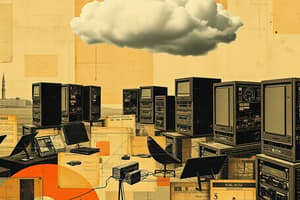Podcast
Questions and Answers
What is the main role of an operating system?
What is the main role of an operating system?
Allocate and manage resources, provide services to users, and ensure separation, isolation, and protection.
What are the main hardware resources in a general system?
What are the main hardware resources in a general system?
Processor, Memory, I/O modules/devices, and Bus.
What is the CPU's role in a computer system?
What is the CPU's role in a computer system?
The CPU controls the operation of the computer by running instructions supported by CPU architecture with the help of associated registers.
How does an operating system provide convenience to users?
How does an operating system provide convenience to users?
What are the two perspectives for defining an operating system?
What are the two perspectives for defining an operating system?
What is the significance of ensuring separation, isolation, and protection in an operating system?
What is the significance of ensuring separation, isolation, and protection in an operating system?
What does the C/IP store?
What does the C/IP store?
What is the function of MAR?
What is the function of MAR?
What does the main memory store?
What does the main memory store?
What is the purpose of I/O AR?
What is the purpose of I/O AR?
What is the system bus?
What is the system bus?
What is the role of a GPU?
What is the role of a GPU?
What is the purpose of a DSP?
What is the purpose of a DSP?
What is the function of MBR?
What is the function of MBR?
What is the purpose of I/O BR?
What is the purpose of I/O BR?
What is the role of MMU?
What is the role of MMU?
Study Notes
- An Operating System (OS) is a software that acts as an interface between hardware and users, managing and allocating resources efficiently and providing services for convenience.
- The OS manages hardware resources such as the processor, memory, I/O devices, and bus.
- The processor is the brain of the computer, controlling operations and executing instructions. It has components like the program counter, memory address register, and memory buffer register, among others.
- Memory is the primary storage area for data and programs, and is managed with a memory management unit (MMU).
- I/O devices include secondary storage, terminals, and communication devices. The bus is a common connection among these components.
- There are various types of processors, including general-purpose processors (CPUs), special-purpose processors like Graphical Processing Units (GPUs) and Digital Signal Processors (DSPs), and multi-processor systems with multiple cores.
- Instruction execution involves fetching and decoding instructions from memory, which are not in human-readable form, and converting them into machine language for execution.
Studying That Suits You
Use AI to generate personalized quizzes and flashcards to suit your learning preferences.
Description
Explore the fundamental concepts of an operating system as the intermediary between hardware and user or software. Learn about resource allocation, resource management, and the provision of services to users, all aimed at efficient resource utilization and user convenience.




